(通用版)八年级英语上册unit7willpeoplehaverobots能
人教版英语八年级上册Unit 7《Will people have robots》教学设计
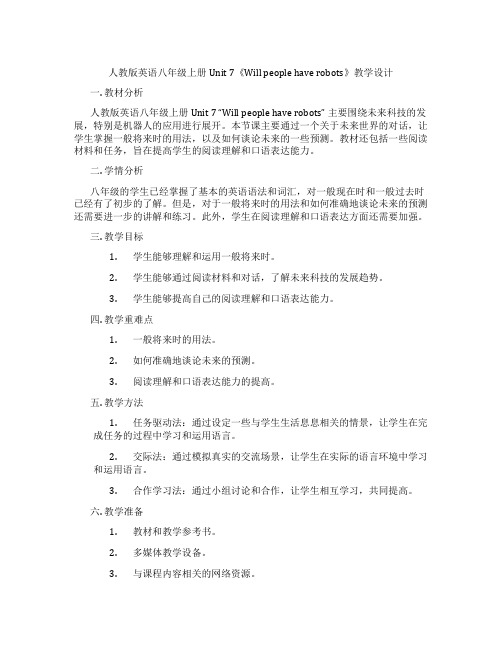
人教版英语八年级上册Unit 7《Will people have robots》教学设计一. 教材分析人教版英语八年级上册Unit 7 “Will people have robots” 主要围绕未来科技的发展,特别是机器人的应用进行展开。
本节课主要通过一个关于未来世界的对话,让学生掌握一般将来时的用法,以及如何谈论未来的一些预测。
教材还包括一些阅读材料和任务,旨在提高学生的阅读理解和口语表达能力。
二. 学情分析八年级的学生已经掌握了基本的英语语法和词汇,对一般现在时和一般过去时已经有了初步的了解。
但是,对于一般将来时的用法和如何准确地谈论未来的预测还需要进一步的讲解和练习。
此外,学生在阅读理解和口语表达方面还需要加强。
三. 教学目标1.学生能够理解和运用一般将来时。
2.学生能够通过阅读材料和对话,了解未来科技的发展趋势。
3.学生能够提高自己的阅读理解和口语表达能力。
四. 教学重难点1.一般将来时的用法。
2.如何准确地谈论未来的预测。
3.阅读理解和口语表达能力的提高。
五. 教学方法1.任务驱动法:通过设定一些与学生生活息息相关的情景,让学生在完成任务的过程中学习和运用语言。
2.交际法:通过模拟真实的交流场景,让学生在实际的语言环境中学习和运用语言。
3.合作学习法:通过小组讨论和合作,让学生相互学习,共同提高。
六. 教学准备1.教材和教学参考书。
2.多媒体教学设备。
3.与课程内容相关的网络资源。
七. 教学过程1.导入(5分钟)通过向学生展示一些机器人的图片,引起学生的兴趣,然后提问:“你们认为未来的人们会拥有机器人吗?”,让学生发表自己的看法。
2.呈现(10分钟)老师通过讲解和示范,向学生介绍一般将来时的用法,并举例说明如何准确地谈论未来的预测。
3.操练(10分钟)学生分组进行角色扮演,模拟真实的交流场景,运用一般将来时进行对话。
老师对学生的表现进行指导和评价。
4.巩固(10分钟)学生阅读教材中的阅读材料,理解并回答相关问题。
册 Unit 7 Will people have robots(1a-2c)教材分析 (新版)人教新目标版
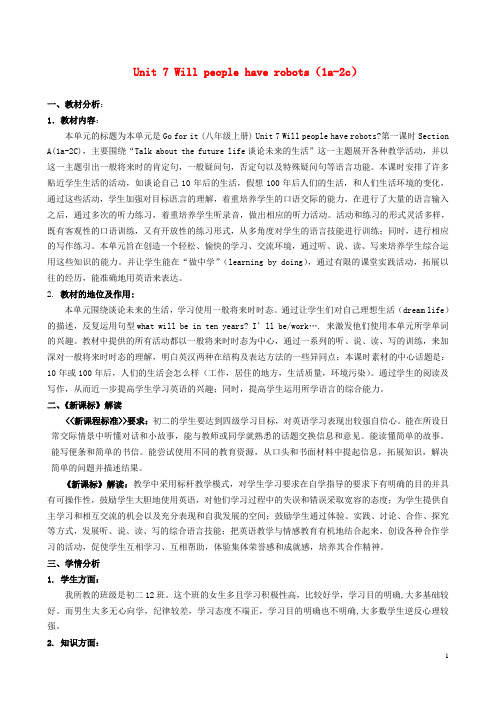
Unit 7 Will people have robots(1a-2c)一、教材分析:1.教材内容:本单元的标题为本单元是Go for it (八年级上册) Unit 7 Will people have robots?第一课时Section A(1a-2C),主要围绕“Talk about the future life谈论未来的生活”这一主题展开各种教学活动,并以这一主题引出一般将来时的肯定句,一般疑问句,否定句以及特殊疑问句等语言功能。
本课时安排了许多贴近学生生活的活动,如谈论自己10年后的生活,假想100年后人们的生活,和人们生活环境的变化,通过这些活动,学生加强对目标语言的理解,着重培养学生的口语交际的能力,在进行了大量的语言输入之后,通过多次的听力练习,着重培养学生听录音,做出相应的听力活动。
活动和练习的形式灵活多样,既有客观性的口语训练,又有开放性的练习形式,从多角度对学生的语言技能进行训练;同时,进行相应的写作练习。
本单元旨在创造一个轻松、愉快的学习、交流环境,通过听、说、读、写来培养学生综合运用这些知识的能力。
并让学生能在“做中学”(learning by doing),通过有限的课堂实践活动,拓展以往的经历,能准确地用英语来表达。
2. 教材的地位及作用:本单元围绕谈论未来的生活,学习使用一般将来时时态。
通过让学生们对自己理想生活(dream life)的描述,反复运用句型what will be in ten years? I’ll be/work…. 来激发他们使用本单元所学单词的兴趣。
教材中提供的所有活动都以一般将来时时态为中心,通过一系列的听、说、读、写的训练,来加深对一般将来时时态的理解,明白英汉两种在结构及表达方法的一些异同点;本课时素材的中心话题是:10年或100年后,人们的生活会怎么样(工作,居住的地方,生活质量,环境污染)。
通过学生的阅读及写作,从而近一步提高学生学习英语的兴趣;同时,提高学生运用所学语言的综合能力。
Unit7Willpeoplehaverobots重点速记语法精讲写作指导阅读提升英语八年级上册(人
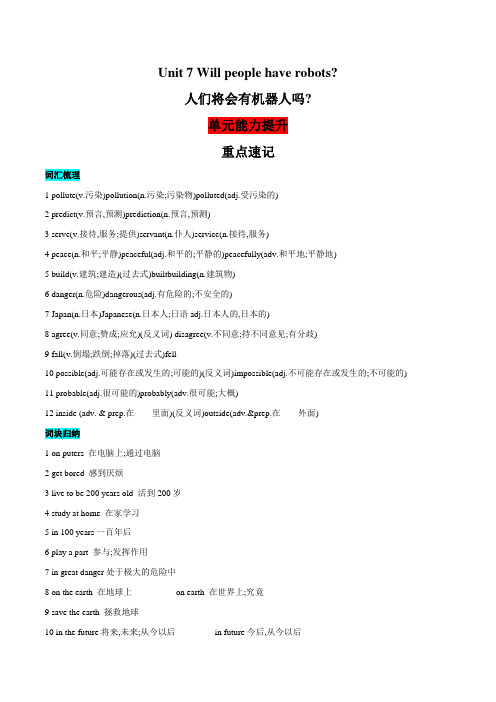
Unit 7 Will people have robots?人们将会有机器人吗?单元能力提升重点速记词汇梳理1 pollute(v.污染)pollution(n.污染;污染物)polluted(adj.受污染的)2 predict(v.预言,预测)prediction(n.预言,预测)3 serve(v.接待,服务;提供)servant(n.仆人)service(n.接待,服务)4 peace(n.和平;平静)peaceful(adj.和平的;平静的)peacefully(adv.和平地;平静地)5 build(v.建筑;建造)(过去式)builtbuilding(n.建筑物)6 danger(n.危险)dangerous(adj.有危险的;不安全的)7 Japan(n.日本)Japanese(n.日本人;日语adj.日本人的,日本的)8 agree(v.同意;赞成;应允)(反义词) disagree(v.不同意;持不同意见;有分歧)9 fall(v.倒塌;跌倒;掉落)(过去式)fell10 possible(adj.可能存在或发生的;可能的)(反义词)impossible(adj.不可能存在或发生的;不可能的)11 probable(adj.很可能的)probably(adv.很可能;大概)12 inside (adv. & prep.在······里面)(反义词)outside(adv.&prep.在······外面)词块归纳1 on puters 在电脑上;通过电脑2 get bored 感到厌烦3 live to be 200 years old 活到200岁4 study at home 在家学习5 in 100 years一百年后6 play a part 参与;发挥作用7 in great danger处于极大的危险中8 on the earth 在地球上on earth 在世界上;究竟9 save the earth 拯救地球10 in the future将来,未来;从今以后in future今后,从今以后11 fresh water淡水12 over and over again 多次;反复地13 look like 看起来像14 look for 寻找;寻求15 wake up 醒来;叫醒16 hundreds of 许多;大量17 fall down 突然倒下;跌倒;倒塌18 take/have a holiday 度假19 move to other planets 搬到其他行星上去20 plant more trees 种更多的树21 do simple jobs 做简单的工作用法总结1 play a part in doing sth.在做某事中起作用2 fewer+可数名词复数更少的······more+可数名词复数/不可数名词更多的·······less+不可数名词更少的·······3 have to do sth.不得不做某事4 There be sb./sth. doing sth.有某人/某物正在做某事.5 make sb. do sth.让某人做某事6 What will…be like?······将会是什么样子?7 agree/disagree with sb.同意/不同意某人(的观点)语法精讲语法示例1.Kids won't go to school.孩子们将不会去上学.(教材P49图片文字)2.Will people use money in 100 years?100年后人们还会使用钱吗?(教材P49 1c)3.Will there be world peace? 世界将会和平吗?(教材P51Grammar Focus)4.I will be an astronaut.我将成为一名宇航员.(教材P52 1d)语法概述一般将来时既可表示将来某个时间要发生的动作或存在的状态,也可表示将来经常或反复发生的动作.其基本结构主要有"be going动词原形"和to+动词"will+动词原形",本单元主要讲的是will型一般将来时.will 本身没有人称和数的变化,常缩写为’ll.其否定形式为will not,常缩写为won't.特别提醒主语为I或we时,也可用"shall+动词原形"表示一般将来时.shall not 常缩写为shan't.Shall we have the meeting?我们要开会吗?No, we shan't.不,我们不开.考向2一般将来时的用法"will+动词原形"常与表示将来的时间状语连用,如tomorrow、the day after tomorrow、next year、in the future等.»My mum hopes that I will be happy and healthy in the future.我妈妈希望我将来开心、健康.特别提醒will也可表示“愿意”.»They won't lend us any more money.他们不愿再借给我们钱了.拓表示位置移动的动词,如go、leave、start、e、arrive等,可用现在进行时表示按计划或安排将要发生的动作.»My father is ing to see me.我父亲就要来看我了.»We're leaving for Beijing.我们要动身去北京.典例1(2022·青海中考)Hurry up! The plane________ in one and a half hours.Don't worry. I will drive you to the airport immediately.A. will take offB. takes offC. took off解析:句意:"快点儿!飞机将在一个半小时后起飞.""别着急.我马上开车送你去机场."根据时间状语"in one and a half hours"可知,此处时态为一般将来时,故选A.考向3 there be 句型的一般将来时结构there be句型的一般将来时结构有两种,即:there will bethere is/are going to be(1)其否定形式是在will或is/are后直接加not;(2)其一般疑问句形式是直接把will或is/are提到句首;(3)肯定回答为"Yes, there will."或"Yes, there is/are.";否定回答为"No, there won't."或"No, there isn't/aren't.".»There will be a party in my house this Friday.=There is going to be a party in my house this Friday.这周五我家将有一场聚会.»There won't be more pollution in the future.将来不会有更多污染.»Will there be fewer trees?将会有更少的树吗?No, there won't.不,不会.»Is there going to be no paper money?将会没有纸币吗?No, there isn't.不,不会.典例2 (2022·丹东中考)Next year,_______ a new road leading to the village.A. there isB. there areC. there will beD. there was解析:句意:明年,将有一条新的路通向这个村庄.next year"明年"是表示将来的时间状语,故此处应用一般将来时,选C.考向4"be going to+动词原形"与"will+动词原形"的区别① be going to 含有"计划;准备"的意思,而will则没有这个意思.»She is going to lend us her book. 她打算把她的书借给我们.②"be going to+动词原形"表示根据目前迹象推断将要发生的事情;"will+动词原形"表示说话人认为、希望、相信或假定要发生的事情.»Listen to the wind. We are going to have a rough crossing.听那风声,我们渡海时风浪一定很大.»He is in hospital and he will get better.他住院了,他会好起来的.③ be going to 可以用在条件状语从句中表示将来,而will不能.»If you are going to attend the meeting, you'd better leave now.如果你打算参加会议,最好现在就动身.特别提醒will表示"意愿,坚持,拒绝"等时,可用于条件句中.»If you will listen to me, I'll give you some advice.如果你愿意听我的,我就给你提些建议.巧学妙记一般将来时的用法将来可能事,will加动原;shall限主语,l/we在前面.计划已做好,迹象在眼前;口语经常见,be going to 加动原.写作指导如何写预测未来的相关文章话题分析本单元的话题是预测未来,是中考常考的一个话题.预测未来的话题常有关环境、机器人、交通工具、工作和生活等.此类文章通常用一般将来时.写作实践(盐城中考)学校将举办英语写作比赛.请根据所给提示,以"My life in 20 years"为题,写一篇参赛短文,分享你对未来的憧憬.注意事项:1.词数:100左右(文章开头已给出,不计入总词数);2.文中不能出现真实姓名、校名等信息;3.文章必须包含所提供的主要信息,并作适当发挥.My life in 20 yearsI'm always working hard for a bright future. I imagine_________________________________________________________________________________________________________________________________________ ____________________________________________________________________________________________ ____________________________________________________________________________________________ ____________________________________________________________________________________________ ____________________________________________________________________________________________ ____________________________________________________________________________________________ ____________________________________________________________________________________________ 思路导引开篇点题I'm always...a bright future.I imagine my life in 20 years.详细描述Family: take good care of my parents, spend more time staying with themFriends: get together, talk about the past school life, travel aroundJob: work much harder, take on more new challenges, try my best表明决心I will work harder to make it e true.词句积累佳作展示My life in 20 yearsI'm always working hard for a bright future. I imagine my life in 20 years.I love my family, so I will take good care of my parents.① I will spend more time staying with them because I'll have more free time.② Besides my family, I will also get together with my friends more often. We will talk about the past school life and travel around together.As for my job, I'm going to be a reporter.③ I think I will work much harder and take on more new challenges.④I will try my best to do every task well.I think my life in 20 years will be exciting and wonderful. And I will work harder to make it e true.名师点评本文层次分明、内容清晰完整,一般将来时运用准确.take good care of、as for、take on、e true等短语的运用,也是本文的亮点.①句是含有because引导的原因状语从句的复合句,并运用了spend some time doing sth.结构,丰富了文章的句式结构.②使用besides自然地引出了和朋友相处的话题.③句是含有省略了引导词that的宾语从句的复合句,work much harder 和take on more new challenges 展现了作者努力工作的态度.④句运用了try one's best to do sth.结构,增加了文章的亮点.阅读提升方法概述细节理解题在阅读理解中占的比重非常大,这类题主要针对时间、地点、人物、事件、方式、结果等进行考查,实际是对文中某个词语、某个句子或某个段落的细节进行设题,一般可直接在文中找到答案.所以答题时,要将题干所涉及的信息在原文中找出来,把相关信息仔细读一遍,比较所给选项与文中细节的区别,排除干扰项,从而确定答案.对相关细节进行理解时,要抓住题干中涉及的时间、地点、人物等有提示作用的信息.中考链接(2022·淮安中考)Once a rich businessman gave his daughter a beautiful necklace. But later the necklace for the girl went missing. The businessman offered a reward of $50,000 for anyone who could find it.One day Robin was walking home along a dirty river. He saw something shining in the river. It was the diamond necklace! He decided to catch it so that he could get the reward.He put his hand in the dirty river and tried to catch the necklace, but somehow missed it.He tried again. This time he walked into the river and put his whole arm in to catch the necklace. But strangely, he still missed it!He came out and started walking away. Then again he saw the necklace, right there. He decided to give it a final try.He jumped into the dirty water and searched everywhere for the necklace but still he failed. He came out feeling very sad.Just then an old man, who was walking by, saw him and asked what was wrong. At first Robin did not want to share the secret with the old man. But finally he decided to tell the truth.30.Robin decided to catch the necklace in the river to________..A. sell it for money B. get the reward C. help the businessman D. marry the girl方法指导根据"He decided to catch it so that he could get the reward"可知,Robin 决定抓住项链是为了得到奖赏.故选B.。
八年级上册英语Unit_7_Will_people_have_robots_Section_B_2a--2e

12. possible adj. 可能的;可能存在或发生 (前缀)im+ possible →impossible 不可能的 e.g. Do you think it’s possible to beat them? 你认为战胜他们有可能吗? To cross this river seems impossible. 穿过这条河中似乎不可能。
what can they do ?
Play the piano
talk
This robot is very strange
What can it do ?
Explore(探险) the universe (宇宙)
What can robots do?
do homework play with people play football walk and dance look for people do unpleasant jobs talk
3. already adv. 已经;早已 e.g. My aunt is already fifty, but she looks very young. 我姑姑早已五十岁了,但她看起 很年轻。
4. dangerous adj. 有危险的;不安全的 名词danger +后缀ous → dangerous e.g. Some animals are in great danger. 一些动物处于极大的危险中。 Lions are dangerous animals. 狮子是危险的动物。
shapes
humans snake huge arm dog
What do you want to be in the future? I will be a pilot.
八年级英语上册Unit7Willpeoplehaverobots基础知识点归纳总结(带答案)

八年级英语上册Unit7Willpeoplehaverobots基础知识点归纳总结单选题1、--The air is very fresh in our city. There is less than before.--Yes. The government has taken action to protect the environment A.woodB.pollutionC.noiseD.water答案:B考查名词辨析。
句意:—我们城市的空气很新鲜.______比以前少了。
—是的。
政府已经采取措施保护环境。
wood 树木;pollution污染;noise 噪音;water水,根据The government has taken action to protect the environment政府已经采取了措施保护环境,可知污染变少,故选B。
2、- will the invitations be sent to our guests?-In three days.A.How oftenB.How soonC.How longD.How far答案:B试题分析:句意:-这些邀请书多久才能送给我们的客人?-三天后。
How often 多久一次,提问频率;How soon多快,多久,用in+一段时间来回答;How long 多长时间,常用for +一段时间来回答;How far多远,提问距离。
根据In three days可知选B。
考点:考查疑问词。
3、Lao She is ________ great writer. He’s especially famous for ________ play Teahouse.A.an; theB.a; theC.an; aD.a; an答案:B句意:老舍是一位伟大的作家。
他尤其因为话剧《茶馆》而出名。
考查冠词。
a不定冠词,放在辅音音素开头的单词前;an不定冠词,放在元音音素开头的单词前; the定冠词,表特指。
八年级英语上册 Unit 7 Will people have robots(1a-2c)教材分析

Unit 7 Will people have robots(1a-2c)一、教材分析:1.教材内容:本单元的标题为本单元是Go for it (八年级上册) Unit 7 Will people have robots?第一课时Section A(1a-2C),主要围绕“Talk about the future life谈论未来的生活”这一主题展开各种教学活动,并以这一主题引出一般将来时的肯定句,一般疑问句,否定句以及特殊疑问句等语言功能。
本课时安排了许多贴近学生生活的活动,如谈论自己10年后的生活,假想100年后人们的生活,和人们生活环境的变化,通过这些活动,学生加强对目标语言的理解,着重培养学生的口语交际的能力,在进行了大量的语言输入之后,通过多次的听力练习,着重培养学生听录音,做出相应的听力活动。
活动和练习的形式灵活多样,既有客观性的口语训练,又有开放性的练习形式,从多角度对学生的语言技能进行训练;同时,进行相应的写作练习。
本单元旨在创造一个轻松、愉快的学习、交流环境,通过听、说、读、写来培养学生综合运用这些知识的能力。
并让学生能在“做中学”(learning by doing),通过有限的课堂实践活动,拓展以往的经历,能准确地用英语来表达。
2. 教材的地位及作用:本单元围绕谈论未来的生活,学习使用一般将来时时态。
通过让学生们对自己理想生活(dream life)的描述,反复运用句型what will be in ten years? I’ll be/work…. 来激发他们使用本单元所学单词的兴趣。
教材中提供的所有活动都以一般将来时时态为中心,通过一系列的听、说、读、写的训练,来加深对一般将来时时态的理解,明白英汉两种在结构及表达方法的一些异同点;本课时素材的中心话题是:10年或100年后,人们的生活会怎么样(工作,居住的地方,生活质量,环境污染)。
通过学生的阅读及写作,从而近一步提高学生学习英语的兴趣;同时,提高学生运用所学语言的综合能力。
人教版英语八年级上册Unit7《Will people have robots_》知识点
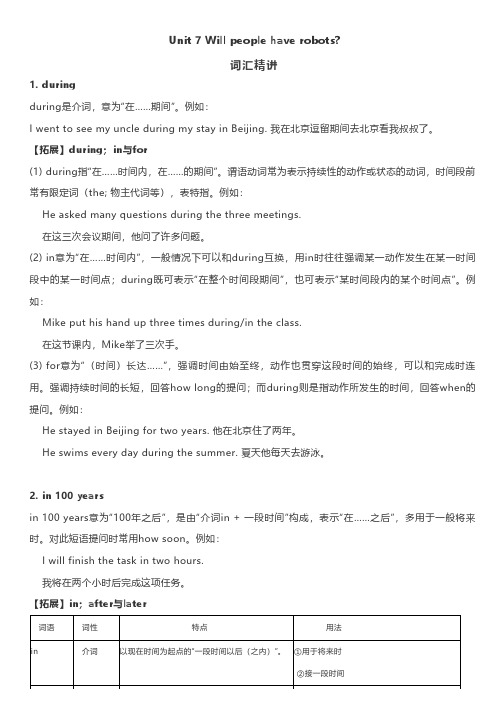
Unit 7 Will people have robots?词汇精讲1. duringduring是介词,意为“在……期间”。
例如:I went to see my uncle during my stay in Beijing. 我在北京逗留期间去北京看我叔叔了。
【拓展】during;in与for(1) during指“在……时间内,在……的期间”。
谓语动词常为表示持续性的动作或状态的动词,时间段前常有限定词(the; 物主代词等),表特指。
例如:He asked many questions during the three meetings.在这三次会议期间,他问了许多问题。
(2) in意为“在……时间内”,一般情况下可以和during互换,用in时往往强调某一动作发生在某一时间段中的某一时间点;during既可表示“在整个时间段期间”,也可表示“某时间段内的某个时间点”。
例如:Mike put his hand up three times during/in the class.在这节课内,Mike举了三次手。
(3) for意为“(时间)长达……”,强调时间由始至终,动作也贯穿这段时间的始终,可以和完成时连用。
强调持续时间的长短,回答how long的提问;而during则是指动作所发生的时间,回答when的提问。
例如:He stayed in Beijing for two years. 他在北京住了两年。
He swims every day during the summer. 夏天他每天去游泳。
2. in 100 yearsin 100 years意为“100年之后”,是由“介词in + 一段时间”构成,表示“在……之后”,多用于一般将来时。
对此短语提问时常用how soon。
例如:I will finish the task in two hours.我将在两个小时后完成这项任务。
英语八年级上册Unit7Willpeoplehaverobots[A-2]
![英语八年级上册Unit7Willpeoplehaverobots[A-2]](https://img.taocdn.com/s3/m/d515b345f4335a8102d276a20029bd64783e620c.png)
(2016福建泉州) — Have you watched the movie Kung Fu Panda 3, Kelly?
— Not yet. I __A____ it with my classmates tonight.
A. will watch
B. was watching
C. have watched
(2016山东临沂) — Did you call Jenny?
— Oh no, I forget. I ___D___ her right
away.
A. called
B. have called
C. call
D. will call
(2015重庆B卷) Please wait. She __D___ to you in a few minutes.
我们明天去看他。
We will go to see him tomorrow. (2) 表示将来经常或反复发生的动作。
从现在起我将每天来。
From now on I will come every day.
2、基本句型:
肯定句: 主语 + will + v. 原形 否定句: 主语 + will + not + v. 原形
There will be more people and cars. Cities will be crowded and polluted.
The environment in earth will be in great danger.
People will have to move to other planets.
八年级英语上册 Unit 7 Will people have robots Reading

Read Para 4. complete the diagram.
hundreds of years How long:________________ look like humans and animals Shapes :___________________
Robots in the future
2.They can do simple jobs many times and
not get bored.
humans
now
in the movie
housework
dirty
Read Para 3. decide True or Fauls.
Scientists are now trying to make robots look like humans
humans
in the movie
housework
dirty
Read Para 2. complete the sentences. 2.Today there are already robots working in factories. Some can help to build cars, and they do simple jobs over and over again. Fewer people will do such jobs in the future because they are boring, but robots will never get bored. 1.Robots can build cars in factories.
talk to people
look after babies
Read and match
八年级英语上册 Unit 7 Will people have robots?(第2课时)说课稿

八年级英语上册 Unit 7 Will people have robots?(第2课时)说课稿一. 教材分析《八年级英语上册》Unit 7 “Will people have robots?” 是人教版新目标英语教材的一个单元。
本单元主要围绕未来科技的发展,特别是机器人在日常生活中的应用进行讲解。
通过本单元的学习,学生可以掌握一般将来时的被动语态,提高自己的听说读写能力,并激发他们对未来科技的想象和思考。
二. 学情分析八年级的学生已经掌握了英语学习的基本语法和词汇,具备一定的听说读写能力。
他们对新科技充满好奇,善于接受新鲜事物,但同时也可能对一些抽象的概念和语言表达感到困惑。
因此,在教学过程中,我们需要关注学生的个体差异,因材施教,激发他们的学习兴趣和积极性。
三. 说教学目标根据《义务教育英语课程标准》和教材内容,本节课的教学目标如下:1.知识目标:学生能够掌握一般将来时的被动语态,理解与未来科技相关的词汇和表达。
2.能力目标:学生能够在真实情境中运用所学知识进行交流,提高听说读写能力。
3.情感目标:激发学生对未来的想象和思考,培养他们对科技发展的积极态度。
四. 说教学重难点1.教学重点:学生能够熟练运用一般将来时的被动语态进行表达。
2.教学难点:学生能够准确理解与未来科技相关的词汇和表达,以及在真实情境中运用所学知识进行交流。
五. 说教学方法与手段本节课采用任务型教学法,结合情境教学法和分组合作学习法,利用多媒体教学手段,激发学生的学习兴趣,提高他们的参与度和积极性。
六. 说教学过程1.导入:通过展示一段关于未来科技的短片,引发学生对未来的想象,激发他们的学习兴趣。
2.呈现:教师通过PPT展示本节课的主要内容,引导学生关注一般将来时的被动语态和与未来科技相关的词汇。
3.操练:学生分组进行角色扮演,运用所学知识进行对话,教师给予指导和反馈。
4.巩固:学生完成一组有关未来科技的练习题,检测他们对知识的掌握程度。
八年级英语上册Unit7Willpeoplehaverobots知识点总结全面整理(带答案)

八年级英语上册Unit7Willpeoplehaverobots知识点总结全面整理单选题1、There ________ a football match this evening. Let’s go and watch it.A.are going to beB.wasC.will beD.were答案:C句意:今晚有一场足球赛。
我们去看吧。
考查there be句型的时态。
根据语境是there be句型,根据时间状语this evening可知,此处是there be的一般将来时,排除BD;其结构是There will be+主语+介词短语或There is/are going to be+主语+介词短语,主语是a football match,排除A。
故选C。
2、—I don't think sixteen-year-olds should be allowed to drive.—________! They are too young.A.I agreeB.It's a pityC.Good luck答案:A句意:——我认为不应该允许16岁的青少年开车。
——我赞同!他们太年轻了。
考查情景交际。
I agree我赞同;It's a pity真遗憾;Good luck祝你好运。
根据答句中“They are too young.”可知是赞同对方的想法,用I agree符合题意。
故选A。
3、To ________ the river means to make the river dirty.A.protectB.polluteC.provide答案:B句意:污染河流意味着河流会变脏。
考查动词词义辨析。
protect 保护;防护;pollute 污染;provide 提供;供应。
由“make the river dirty”可知此空应填污染。
故选B。
4、Could I use your dictionary? I need to _________ the new words.A.pick upB.look upC.clean upD.give up答案:B句意:我能用一下你的词典吗?我需要查一些生词。
八年级英语上册Unit7Willpeoplehaverobots知识点总结归纳(带答案)

八年级英语上册Unit7Willpeoplehaverobots知识点总结归纳单选题1、Please wait. She ________ to you in a few minutes.A.talkB.talkedC.have talkedD.will talk答案:D句意:请等等。
她几分钟后就会和你说话。
考查动词时态辨析。
In+时间段,在过这段时间以后,用于将来时;in a few minutes:几分钟以后,是将来的时间,要用将来时,故选D。
2、— Do you think ________ an art show next week?— Yes, I think so.A.there haveB.there will haveC.there will beD.there is going to have答案:C句意:——你认为下星期有一个艺术展吗?——是的,我想是的。
考查there be结构。
there be表存在,have表拥有,二者不可混用,可排除BD两项;there have没有此类搭配,可排除。
分析句子结构,本句是宾语从句;由next week可知从句是一般将来时;there be结构的一般将来时态是there will be或there is going to be;故选C。
3、There ______ an English show this weekend. Shall we go and watch it?A.are going to beB.wasC.will beD.were答案:C句意:这个周末将有一场英语表演。
我们去看好吗?考查there be句型的一般将来时。
根据“There”及“this weeken d”可知,此句要用there be句型的一般将来时there is/are going to be或there will be的结构,排除B和D选项。
an English show是单数,be要用is,排除A,故选C。
八年级英语上册Unit7Willpeoplehaverobots教案
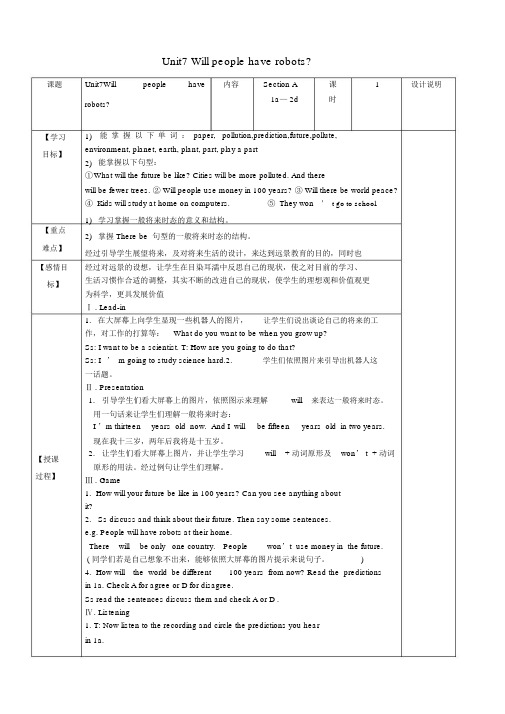
课题Unit7 Will people have robots?Unit7Will people have内容Section A课1设计说明robots?1a— 2d时【学习目标】【重点难点】【感情目标】【授课过程】1) 能掌握以下单词: paper, pollution,prediction,future,pollute, environment, planet, earth, plant, part, play a part2) 能掌握以下句型:①What will the future be like? Cities will be more polluted. And therewill be fewer trees. ② Will people use money in 100 years? ③ Will there be world peace?④ Kids will study at home on computers.⑤ They won’ t go to school.1)学习掌握一般将来时态的意义和结构。
2)掌握 There be 句型的一般将来时态的结构。
经过引导学生展望将来,及对将来生活的设计,来达到远景教育的目的,同时也经过对远景的设想,让学生在目染耳濡中反思自己的现状,使之对目前的学习、生活习惯作合适的调整,其实不断的改进自己的现状,使学生的理想观和价值观更为科学,更具发展价值Ⅰ . Lead-in1.在大屏幕上向学生显现一些机器人的图片,让学生们说出谈论自己的将来的工作,对工作的打算等:What do you want to be when you grow up?Ss: I want to be a scientist. T: How are you going to do that?Ss: I’ m going to study science hard.2.学生们依照图片来引导出机器人这一话题。
八年级英语上册unit7willpeoplehaverobots知识点+练习
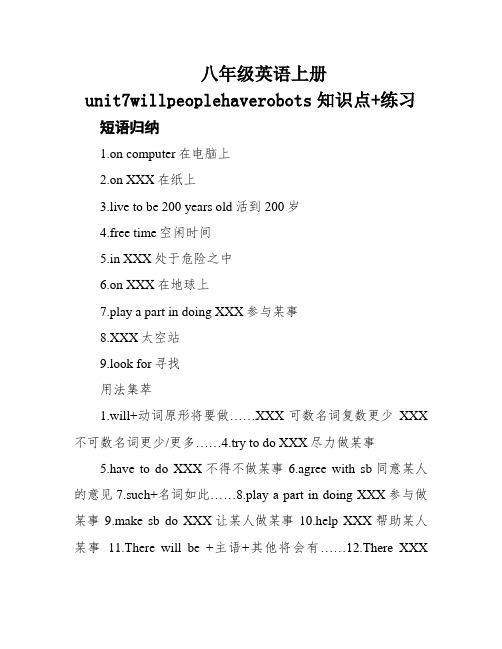
八年级英语上册unit7willpeoplehaverobots知识点+练习短语归纳1.on computer在电脑上2.on XXX在纸上3.live to be 200 years old活到200岁4.free time空闲时间5.in XXX处于危险之中6.on XXX在地球上7.play a part in doing XXX参与某事8.XXX太空站9.look for寻找用法集萃1.will+动词原形将要做……XXX可数名词复数更少XXX 不可数名词更少/更多……4.try to do XXX尽力做某事5.have to do XXX不得不做某事6.agree with sb同意某人的意见7.such+名词如此……8.play a part in doing XXX参与做某事9.make sb do XXX让某人做某事10.help XXX帮助某人某事11.There will be +主语+其他将会有……12.There XXX有……正在做某事13.It is +形容词+for sb +to do XXX做某事对某人来说是怎样的14.XXX.It takes sb some time/money to do XXX“曾经”,通经常使用于肯定句16.hundreds of许多、大量,与具体数字连用时,用单数且不与of连用。
如:five XXX。
n。
XXX与其用法相同17.XXX透露表现信赖或人说的话XXX信赖或人的为人18.et to do XXX遗忘去做某事XXX遗忘做了某事重点句子:1.They are usually like human servants.他们就像是人类的仆人。
2.They help with the housework and do jobs like working in dirty or dangerous places.他们协助做家务及一些在比力脏或风险的中央工作的工作。
【配套K12】[学习]八年级英语上册 Unit 7 Will people have robots
![【配套K12】[学习]八年级英语上册 Unit 7 Will people have robots](https://img.taocdn.com/s3/m/a80281d204a1b0717ed5dd1e.png)
Unit 7 Will people have robotsSelf Check知能演练提升Ⅰ.根据句意及首字母提示完成单词1.We never know what will happen in the f .2.I’ll do everything p to help you.3.Look!There are two planes in the s .4.E a child can do it.It’s easy.5.What will our life be l in 100 years?Ⅱ.用所给单词的适当形式填空1.Though there will be bad things,I’m not (scare).2.No one in our class (like)playing computer games.3.Her daughter (fly)to France last week.4.No,I (agree).I don’t think it will be the right thing to do.5.We should help people in (dangerous).★Ⅲ.阅读理解Four students are talking about the future after class.1. thinks that people can spend their holiday on the moon in the future.A.Deng YuB.Zhang LanC.Sun WeiD.Liu Yuan2.What does Zhang Lan think will happen in the future?A.People will live in a world without wars.B.Robots will do the things that people don’t want to do.C.People can talk with the spacemen.D.There will be more pandas living happily in China.3.From the passage,we can know that .A.people are still polluting the earth todayB.the 50th Olympic Games will take place in 2052C.we will have the same food in 2050 as we have nowD.all the people will move to another planet in the future答案:Ⅰ.1.future 2.possible 3.sky 4.Even 5.likeⅡ.1.scared 2.likes 3.flew 4.disagree/don’t agree5.danger Ⅲ.1.D 2.A 3.A。
八年级英语上册Unit7Willpeoplehaverobots知识汇总笔记(带答案)

八年级英语上册Unit7Willpeoplehaverobots知识汇总笔记单选题1、—________ a tall teaching building in our school in the future?—I am not sure.A.Will there beB.Will there isC.Will there haveD.Will there has答案:A句意:——我们学校将来会有一座很高的教学楼吗?——我不确定。
考查there be句型。
根据“in the future”可知用一般将来时,there be句型的一般将来时用there will be结构,一般疑问句将will置于句首。
故选A。
2、It takes________ one hour________ English every day.A.I; readB.me; readC.me; to readD.I; to read答案:C句意:每天花费我半个小时的时间去读英语。
考查it的固定句型的用法。
I我,主格;me我,宾格。
It takes sb sometime to do sth固定句型,表示“花费某人时间去做某事”。
句中的sb位于谓语动词后,所以应用其宾格形式;此处的动词不定式在句中作主语。
故选C。
3、—A study shows that good habits play a very important _________ in children’s education.—I think so.A.senseB.partC.reasonD.meaning答案:B句意:——研究表明好的习惯在孩子的教育中起重要的作用。
——我也这么想。
考查名词辨析。
sense感觉;part部分;reason 原因,理由;meaning意思,意义。
play a part in…对……有影响,对……有作用,固定结构。
故选B。
4、It is_______a beautiful garden______we like to play in it.A.so; thatB.such; thatC.too; toD.very; that答案:B句意:这是一个如此美丽的花园以致我们都喜欢在其中玩。
